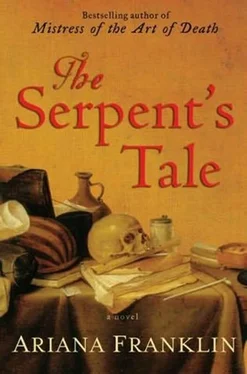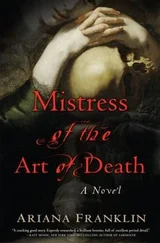There were no inns on these high tracks, and the bishop refused to waste time by descending to find one. “We’ll make camp,” he said.
When, eventually, he allowed them to dismount, Adelia’s muscles protested as she struggled to get off her horse. She looked with anxiety toward Gyltha, who was struggling off hers. “Are you surviving?” Tough as leather the fenwoman might be, but she was still a grandmother and entitled to better treatment than this.
“I got sores where I wou’n’t like to say.”
“So have I.” And stinging as if from acid.
The only one looking worse than they did was Father Paton, whose large breakfast at Saint Albans had been jolting out of him, amidst groans, for most of the way. “Shouldn’t have gobbled it,” Gyltha told him.
Baby Allie, on the other hand, had taken no harm from the journey; indeed, snuggled in her pannier, she appeared to have enjoyed it, despite her hurried feeds when Bishop Rowley had permitted a stop to change horses.
Carrying her with them, the two women retired to the cart and ministered to their wounds with salves from Adelia’s medicine chest. “The which I ain’t letting Father Fustilugs have any,” Gyltha said vengefully of Father Paton. She’d taken against him.
“What about Mansur? He’s not used to this, either.”
“Great lummox…” Gyltha liked to hide her delight in and love for the Arab. “He’d not say a word if his arse was on fire.”
Which was true; Mansur cultivated stoicism to the point of impassivity. His sale as a little boy to Byzantine monks who’d preserved the beauty of his treble singing voice by castration had taught him the futility of complaining. In all the years since he’d found sanctuary with Adelia’s foster parents and become her bodyguard and friend, she’d never heard him utter a querulous sentence. Not that he uttered many words in strange company anyway; the English found him and his Arab dress outlandish enough without the addition of a child’s squeaky speaking voice issuing from a man six feet tall with the face of an eagle.
Oswald and Aelwyn, the men-at-arms, and Walt, the groom, were uneasy in their dealings with him, apparently crediting him with occult powers. It was Adelia they treated like dirt-though never if Rowley was looking. At first she’d put their discourtesies down to the rigors of the journey, but gradually they became too marked to be disregarded. Unless the bishop or Mansur was nearby, she was never assisted onto a horse nor down, and the occasions when she went off into the trees to answer a call of nature were accompanied by low, offensive whistles. Once or twice she heard Ward yelp as if he’d been kicked.
Nor had she and Gyltha been provided with sidesaddles. Rowley had ordered them, but somehow, in the haste, they’d been forgotten, leaving the women perforce to ride astride, an unseemly posture for a lady though, actually, one that Adelia preferred because she considered sidesaddles injurious to the spine.
Nevertheless, the omission had been uncivil and, she thought, intended.
To church servants like these, she was a harlot, of course; either the bishop’s trull or the Saracen’s, perhaps both. For them it was bad enough to be chasing across country in bad weather to attend the funeral of a king’s mistress without dragging another whore along with them.
“What’s she with us for?”
“God knows. Clever with her brains, so they say.”
“Clever with her quim more like. Is that his lordship’s bastard?”
“Could be anybody’s.”
The exchange had been made where she could overhear it.
Damn it, this would harm him. Rowley had been appointed by Henry II against the wishes of the Church, which had wanted its own man to fill the post of Saint Albans and still hoped for a reason to dismiss the king’s candidate. Knowledge that he’d fathered an illegitimate child would give his enemies their chance.
Damn the Church, Adelia thought. Our affair was over before he became a bishop. Damn it for imposing impossible celibacy on its people. Damn it for hypocrisy-Christendom was littered with priests wallowing in varieties of sin. How many of them were condemned?
And damn it for its hatred of women-an abuse of half the world’s inhabitants, so that those who refused to be penned into its sheepfold were condemned as harlots and heretics and witches.
Damn you, she thought of the bishop’s men, are you so innocent? Are all your children born in wedlock? Which of you jumped over the broom stick with a woman rather than legally marry her?
And damn you, Bishop Rowley, for placing me in this situation.
Then, because she was feeding Allie, she damned them all again for making her angry enough to damn them.
Father Paton escaped her curses; unlovable as he was, he at least treated her like he treated everybody else-as a sexless and unfortunate expense.
The messenger, Jacques, a gauche, large-eared, somewhat overeager young man, seemed more kindly inclined to her than the others, but the bishop kept him on the gallop with taking messages and preparing the way ahead, so she saw little of him.
With imperceptible difference, the Icknield Way became the Ridgeway. The cold was gaining an intensity that leeched strength out of humans and horses, but they were at least approaching the Thames and the Abbey of Godstow, which stood on one of its islands.
Jacques rejoined the company, appearing from the trees ahead like a mounted white bear. He shook himself free of snow as he bowed to Rowley. “Abbess Mother Edyve sends greetings to your lordship and her joy to accommodate you and your party whenever you will. Also, I was to say that she expects the body of the Lady Rosamund to be brought to the convent by river today.”
Rowley said heavily, “So she is dead.”
“I trust so, my lord, for the nuns intend to bury her.”
His bishop glared at him. “Go back there. Tell them we should arrive tonight and that I am bringing a Saracen doctor to examine Lady Rosamund’s corpse and determine how she died.” He turned to Adelia and said in Latin, “You’ll want to see the body, won’t you?”
“I suppose so.” Though what it could tell her, she wasn’t sure.
The messenger stopped long enough to stuff bread, cheese, and a flask of ale into his saddlebag before remounting.
“Shouldn’t you rest first?” Adelia asked him.
“Don’t mind for me, mistress. I sleep in the saddle.”
She wished she could. To stay in it at all took strength. Father Paton’s provision of cloaks had been of the cheapest wool and, wearing them, she, Gyltha, and Mansur would have frozen to death on horseback if it hadn’t been for the rough mantles of beaver fur they had brought with them. The fenland was full of beaver, and these were gifts from a grateful trapper Adelia had nursed through pneumonia.
That afternoon the travelers descended from the hills to the village of Thame and the road leading to Oxford. It was getting dark, still snowing, but the bishop said, “Not far now. We’ll press on with lanterns.”
It was terrible going; the horses had to be rugged even though they were kept moving. Soon they had to be fitted with headbands that fringed their eyes, usually a device to keep off flies, so they would not be blinded by the thick flakes that swirled and stuck to the lashes.
It was impossible to see beyond a yard. If the road hadn’t run between hedges, they would have lost their way, lanterns or no lanterns, and ended in a field or river. When the hedges disappeared at a crossroads, Rowley had to call a halt until they found the right track again, which meant the men had to search for it, all the time calling to each other in case any one of them blundered away-an error that, in this cold, would cost him his life.
Читать дальше











